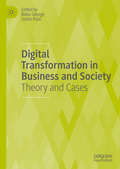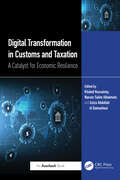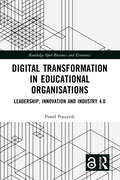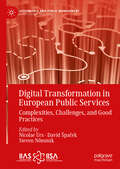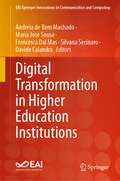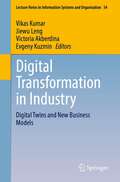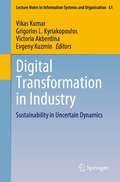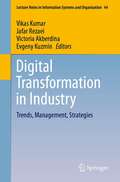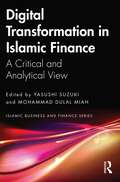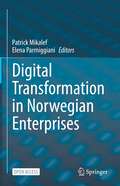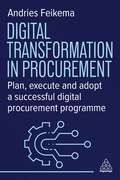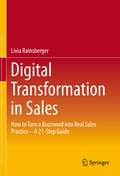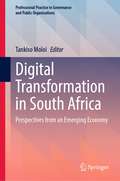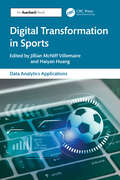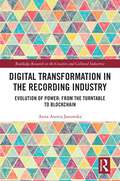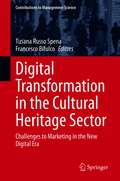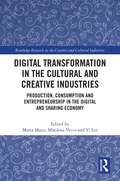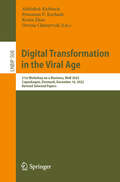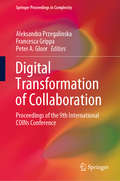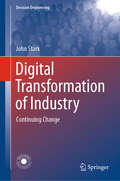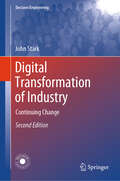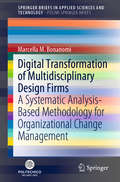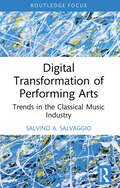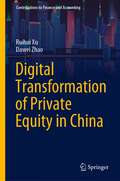- Table View
- List View
Digital Transformation in Business and Society: Theory and Cases
by Justin Paul Babu GeorgeThe digital traces that people leave behind as they conduct their daily lives provide a powerful resource for businesses to better understand the dynamics of an otherwise chaotic society. Digital technologies have become omnipresent in our lives and we still do not fully know how to make the best use of the data these technologies could harness. Businesses leveraging big data appropriately could definitely gain a sustainable competitive advantage. With a balanced mix of texts and cases, this book discusses a variety of digital technologies and how they transform people and organizations. It offers a debate on the societal consequences of the yet unfolding technological revolution and proposes alternatives for harnessing disruptive technologies for the greater benefit of all. This book will have wide appeal to academics in technology management, strategy, marketing, and human resource management.
Digital Transformation in Customs and Taxation: A Catalyst for Economic Resilience
by Khaled Hussainey Nasser Salim Albaimani Al Qamashoui, Aziza AbdallahThe landscape of customs and taxation is experiencing a significant shift, driven by digital technologies and innovative frameworks. This transformation redefines how nations enforce compliance, collect revenues, and engage in international trade. With deepening digitalization, countries are adopting such advancements as AI, blockchain, and machine learning to tackle evolving challenges in the tax and customs sector.Some of the highlights discussed by this book include: Customs reform and modernization Challenges facing excise and customs tax administration in the digital era AI’s impact on customs and taxation AI and machine learning in tax fraud evasion detection and compliance How AI improves the efficiency of accounting software to facilitate functioning taxes and customs authorities Blockchain applications in value-added tax collection Digital Transformation in Customs and Taxation: A Catalyst for Economic Resilience addresses the concerns, difficulties, trends, and opportunities related to digital transformation in customs and taxation. It provides knowledge and insights to navigate this evolving landscape. It presents ways to enable effective and efficient customs and tax services in the digital economy. To discuss the problems and nuances of incorporating digital solutions into customs and tax systems, the book looks at how industries employ technology to improve efficiency, effectiveness, and compliance. It offers practical approaches and solutions for dealing with the challenges that arise when implementing digital transformation projects in this industry. Real-world case studies, examples, and best practices illustrate how to efficiently use digital tools and platforms to improve services.Filled with insight into how digital transformation can redefine traditional practices, enhance efficiency, and build resilient systems for future demands, this book is a resource for policymakers, academics, and professionals seeking to innovate customs and tax administration.
Digital Transformation in Educational Organizations: Leadership, Innovation and Industry 4.0 (Routledge Open Business and Economics)
by Paweł PoszytekTechnological transformation should lead to enhance people’s potential and the development of their cognitive and social competences, especially those connected with effective communication on different levels. The COVID-19 pandemic has intensified all these processes and, for better resilience and effectiveness at work, it requires now different sets of competences. This book gives direct insight into changes that take place in education in the context of an unprecedented and rapid technological advancement, which requires the reorientation of goals and functions based on innovative, adaptive and flexible solutions – in most cases driven by individual leadership. It describes the way to reach this reorientation and shows through thorough research how educational leaders position themselves on this way in this fast-changing ecosystem. Exploring how educational leaders manage the challenges of digital transformation, using European collaborative projects, this research volume discusses how this process impacts the effectiveness and sustainability of organizational activities. Establishing a model for assessing digital transformation in educational organizations and evaluating the effectiveness of their leaders, it will be of value to researchers, academics, practitioners, and advanced students in the fields of leadership, organizational change, management of technology and innovation, and those interested in the development of education and the utilization of digitalization.
Digital Transformation in European Public Services: Complexities, Challenges, and Good Practices (Governance and Public Management)
by David Špaček Nicolae Urs Steven NõmmikThis book examines digital transformation in the public sector. Drawing on case studies from around Europe, it identifies management practices that facilitate or hinder the implementation of digital transformation in various contexts and at different levels of government. Chapters consider how digital technologies are being used to improve public service delivery, how public institutions are employing AI, and the potential benefits for organizations and citizens. They also assess the obstacles to digital transformation, including budget constraints, legislation, and insufficient expertise. Providing nuanced insights from real-world projects that have sought to usher public sector institutions into the digital age, the book highlights what has worked well, what has not worked, and why. In doing so, it offers lessons for future projects and acts as a comprehensive guide offering actionable insights for academics and practitioners. It will appeal to all those interested in public administration, public management, and digital transformation.
Digital Transformation in Higher Education Institutions (EAI/Springer Innovations in Communication and Computing)
by Silvana Secinaro Maria José Sousa Andreia de Bem Machado Francesca Dal Mas Davide CalandraThis book analyzes digital technologies being used in the teaching-learning process. The authors show how the use of AI in higher education can provide personalized education through the automation of administrative teaching tasks, software programs that favor the detection of topics that need reinforcement in the classroom, the guidance and support of students outside the classroom, and the use of data intelligently to teach and support students. In addition, the authors show how to further personalize education with the use of augmented reality, adaptive platforms, intelligent tutor systems, Chatbots, adaptive learning, computer aided instruction, MOOCs, and robotics. The authors answer questions such as: What sustainable educational technologies can be used in the teaching-learning process; How can Blockchain technology and AI be applied in higher education; How can the metaverse be applied in virtual learning environments? The book is relevant to researchers, professionals, andstudents interested in technology and education.
Digital Transformation in Industry: Digital Twins and New Business Models (Lecture Notes in Information Systems and Organisation #54)
by Vikas Kumar Victoria Akberdina Evgeny Kuzmin Jiewu LengThis book offers a selection of the best papers presented at the annual international scientific conference “Digital Transformation in Industry: Trends, Management, Strategies (DTI2021),” held by the Institute of Economics, Ural Branch of the Russian Academy of Sciences, in Ekaterinburg (Russia) on October 29, 2021. The book focuses on the idea of introduction mechanisms for digitization processes and on highlighting successful digital transformation strategies in all sectors of industry. Key topics include the development of a cyber-physical production system for Industry 4.0; digital design technologies for enhancing the competitiveness of products and companies; digital twin-driven product manufacturing and services; and the effects of the industrial digital transformation on society and the environment. With regard to implementing IT and other technological innovations, lessons learned in developed and developing economies, as well as small and large enterprises, are included. Given its scope, the book offers a valuable asset for researchers and managers of industrial organizations alike.
Digital Transformation in Industry: Sustainability in Uncertain Dynamics (Lecture Notes in Information Systems and Organisation #61)
by Vikas Kumar Grigorios L. Kyriakopoulos Victoria Akberdina Evgeny KuzminThis book offers a selection of the best papers presented at the annual international scientific conference “Digital Transformation in Industry: Trends, Management, Strategies,” which was held by the Institute of Economics of the Ural Branch of the Russian Academy of Sciences (Ekaterinburg, Russia) on October 28, 2022.The book focuses on concepts for initiating digitalization processes and identifying successful digital transformation strategies in all sectors of industry. Key topics include the sustainability of digital transformation in uncertain dynamics; conditions of uncertainty and barriers; industrial logistics in the new reality; best practices for implementing digital solutions to ensure sustainable, barrier-free and flexible supply chains; the achievement of sustainability in the process of digital transition; the adaptation of enterprises to the ESG concept through digital solutions; assessing the impact of industrial digital transformation on society and the environment; and clarifying how ESG aspects affect the economy. The experiences of various countries, regions and types of enterprise implementing IT and other technological innovations are also included, making the book a valuable asset for researchers and managers alike.
Digital Transformation in Industry: Trends, Management, Strategies (Lecture Notes in Information Systems and Organisation #44)
by Vikas Kumar Jafar Rezaei Victoria Akberdina Evgeny KuzminThis book offers a selection of the best papers presented at the international scientific conference "Digital Transformation in Industry: Trends, Management, Strategies", held by the Institute of Economics of the Ural Branch of the Russian Academy of Sciences, Russia in November 2020. The main focus of the book is to evaluate trends and perspectives of digital transformation in industry and industrial markets through the dissemination of Industry 4.0. The aim of the topics discussed is to create an idea of introduction mechanisms for digitization processes and to specify successful strategies of digital transformation in all sectors of industrial enterprises. The experience of developed and developing economies, as well as small and large enterprises implementing IT and other technological innovations are included. Students as well as managers of industrial organizations alike can benefit from the results of the topics covered.
Digital Transformation in Islamic Finance: A Critical and Analytical View (Islamic Business and Finance Series)
by Yasushi Suzuki Mohammad Dulal MiahThe ongoing digital transformation is shaping the Islamic mode of financial intermediation and the impact on the faith-based financial mode has been multifaceted. This has raised a host of interesting questions: what is the degree of penetration of Islamic finance in the fintech industry? Are Islamic financial institutions (IFIs) or banks ready to embrace fintech? Is fintech an enabler or barrier to achieve the intended purpose of Islamic finance? Will technology narrow the division between Islamic and conventional finance in the future? These are existential questions for Islamic finance and the book endeavors to examine the impact of financial technology on the industry. The book assesses various fintech business models and how they could be a threat or an opportunity. It also examines whether fintech provides IFIs an edge to serve clients following the Shariah norms and how the adoption of fintech in the Islamic mode is required for meeting the maqasid Al Shariah. The book discusses applicability of fintech like blockchain, digital currency, big data, and AI to different branches of Islamic finance. This book will interest students, analysts, policymakers, and regulators who are working on Islamic finance, financial economics, Islamic economics, and development finance.
Digital Transformation in Norwegian Enterprises
by Patrick Mikalef Elena ParmiggianiThis open access book presents a number of case studies on digital transformation in Norway, one of the fore-runners in the digital progress index established by the European Commission in 2020. They explore the process of adoption, diffusion and value generation from digital technologies, and how the use of different digital solutions has enabled Norwegian enterprises to digitally transform their operations and business models.The book starts with an introductory chapter summarizing a vast body of literature in order to synthesize what is already known about digital transformation before exploring the Norwegian context in more detail. Then a series of case studies from the private and public sector in Norway is presented. They document a process perspective which describes the sequence of events during and after adoption of digital solutions, as well as the types of business value that were realized. Through these single studies, the process of digital transformation is illustrated, a number of key findings highlighted, and eventually theoretical and practical recommendations based on these cases emphasized. The book closes with a brief overview of some emerging technologies, and comments on how they are likely to change different sectors. Digital transformation has been one of the priority areas for the Norwegian government over the past years and puts Norwegian enterprises upfront in adopting novel technologies and utilizing them for achieving organizational goals. This experience accumulated over the years makes the Norwegian context a particularly interesting one in understanding how private and public organizations make use of new digital solutions, what lessons can be learnt during the process, and what are some of the key success and failure factors. This way the book is written for practitioners who are currently involved in digital transformation projects in their organizations, researchers of information systems and management, as well as master students in degrees of informatics and technology management.
Digital Transformation in Procurement: Plan, Execute and Adopt a Successful Digital Procurement Programme
by Andries FeikemaWith digitalization a consistent theme on every procurement leader's agenda, this book provides a practical approach, empowering leaders to skilfully navigate the intricacies of digital transformation in procurement. Many procurement leaders struggle to deliver their digitalization agendas due to slow, costly and underwhelming results. Digital Transformation in Procurement is designed to help procurement leaders embrace digital transformation and drive top-line growth. Covering the essential success factors, the impact of digitalization on people, organization processes and technology, this book helps leaders in procurement make any digitalization transformation a success and deliver value at scale. Digital Transformation in Procurement is a practical resource offering valuable insights, frameworks and examples from global procurement transformation programmes. Taking a holistic approach to digital transformation, this book covers key challenges, new technologies and how procurement leaders can make digitization work for them. This is the book every procurement leader needs to launch their new procurement strategy for the digital age.
Digital Transformation in Sales: How to Turn a Buzzword into Real Sales Practice – A 21-Step Guide
by Livia RainsbergerThis book is a practical guide to the digital transformation of sales organizations. In 21 steps, it provides an overview of the state of the art of technologies and digital sales tools and creates an understanding of what the digitization of sales is really about. The primary driver of digitization is the modern customer, and it is important to always keep him in mind throughout the entire sales strategy. The sole use of technologies and the pure digitization of processes are not enough to make an organization fit for the challenges of the modern business world. All tools and processes from positioning to customer management are explained in detail in this book and illustrated with concrete examples. What do chatbots do, what are virtual and augmented reality suitable for, and what is the benefit of rapid prototyping? Which sales activities can be supported by digitalization? The author provides answers to these and many other questions and shows how sales managers can make themselves fit for the future. With concrete tips and numerous implementation aids.
Digital Transformation in South Africa: Perspectives from an Emerging Economy (Professional Practice in Governance and Public Organizations)
by Tankiso MoloiThis book examines the adoption of digital technologies in different sectors in South Africa. The authors investigate how digital innovation impacts development in various areas in the public and private sectors. Chapters in the book cover digital transformation in authorities and government bodies and how this transforms governance, this includes digital transformation for good governance in the public sector, tax authorities, local government, and traditional authorities. The second set of chapters emphasizes the digital transformation of business corporations, such as digital transformation lessons for small businesses, digital transformation of finance, and the banking sector. Other chapters delve into enterprise processes such as auditing, corporate reporting, good corporate reputation, enterprise risk management, and marketing environment. The book will appeal to an audience of scholars and professionals wanting to understand more about the role of digital transformation in emerging economies and how innovation influences economic growth.
Digital Transformation in Sports (Data Analytics Applications)
by Haiyan Huang Jillian McNiff VillemaireThe sports industry is one of the most robust and competitive sectors in the world. Over the last decade, the integration of technology into sports has dramatically transformed the dynamics of how the sports industry operates. Sports analytics (i.e., the integration of data science and sports) is at the forefront of this digital transformation. Sports analytics encompasses the applications of innovative technologies and advanced analytical techniques to assess and enhance performance of players and teams, improve decision-making across diverse aspects, and bolster competitive advantages and strategies.Digital Transformation in Sports explores the key driving forces and emerging trends that are fueling the digital transformation of the sports industry. It presents a collection of chapters that delve into state-of-the-art research and real-world applications of sports analytics, providing a diverse perspective on its transformative impact across different sports sectors. It showcases how advanced technologies such as the Internet of Things (IoT), machine learning (ML), and artificial intelligence (AI) are revolutionizing player performance, strategic decision-making, fan engagement, and operational efficiency. For example, by utilizing sensors, wearable technologies, tracking devices, and 5G networks, IoT technologies can collect an unprecedented amount of data in real time and enable the near-instantaneous transmission of this data to the centralized platforms for analysis. Sophisticated analytics powered by AI and ML enable the extraction of actionable insights from this raw data, transforming it into valuable intelligence that drives better decision-making.By offering a bridge between theoretical frameworks and practical applications, this book demonstrates how such concepts as technology acceptance theories inform the successful implementation and adoption of analytics solutions. By drawing upon interdisciplinary insights, the chapters provide valuable tools and frameworks for researchers, analysts, practitioners, and stakeholders, delivering actionable guidance to harness the full potential of analytics in the rapidly evolving sports landscape.
Digital Transformation in The Recording Industry: Evolution of Power: From The Turntable To Blockchain (Routledge Research in the Creative and Cultural Industries)
by Anna Anetta JanowskaThe recording industry has famously been transformed by technology throughout its entire history.The book presents an analysis of these changes using Porter's five forces model. The author highlights the evolution of buyers' and suppliers' power, the emergence of new competitors, product innovation and rivalry between companies in the industry driven by economic, political, social and legal factors.As an early mover in the social diffusion of copyright-sensitive content, the recording industry reflected in this book serves as an important reference for the analysis of other cultural and creative sectors.
Digital Transformation in the Cultural Heritage Sector: Challenges to Marketing in the New Digital Era (Contributions to Management Science)
by Tiziana Russo Spena Francesco BifulcoThis book devises an alternative conceptual framework to understand digital transformation in the cultural heritage sector. It achieves this by placing a high importance on the role of technology in the strategic process of modeling and developing cultural services in the digital era. The focus is on how marketing activities and customer processes are being transformed by digital technologies to create better value, which can also be communicated to customers through an engaged and personalized approach. Much of the digital debate in cultural heritage is still in infancy. Some existing studies are anecdotal and often developed within the domain of established research streams, including studies with some technological aspects addressed partially and from an episodic or periodic perspective. Moreover, the critical changes that have emerged in the cultural management landscape are yet to be highlighted. This book fills that gap and provides a perspective on the cultural heritage sector, which uses the new social and technology landscape to describe the digital transformation in cultural heritage sectors. The authors highlight an inclusive perspective that addresses marketing strategy in the digital era as a proactive, technology-enabled process by which firms collaborate with customers to jointly create, communicate, deliver, and sustain experience and value co-creation.
Digital Transformation in the Cultural and Creative Industries: Production, Consumption and Entrepreneurship in the Digital and Sharing Economy (Routledge Research in the Creative and Cultural Industries)
by Marta Massi, Marilena Vecco and Yi LinThis research-based book investigates the effects of digital transformation on the cultural and creative sectors. Through cases and examples, the book examines how artists and art institutions are facing the challenges posed by digital transformation, highlighting both positive and negative effects of the phenomenon. With contributions from an international range of scholars, the book examines how digital transformation is changing the way the arts are produced and consumed. As relative late adopters of digital technologies, the arts organizations are shown to be struggling to adapt, as issues of authenticity, legitimacy, control, trust, and co-creation arise. Leveraging a variety of research approaches, the book identifies managerial implications to render a collection that is valuable reading for scholars involved with arts and culture management, the creative industries and digital transformation more broadly.
Digital Transformation in the Recording Industry: Evolution of Power: From The Turntable To Blockchain (Routledge Research in the Creative and Cultural Industries)
by Anna Anetta JanowskaThe recording industry has famously been transformed by technology throughout its entire history. The book presents an analysis of these changes using Porter's five forces model. The author highlights the evolution of buyers' and suppliers' power, the emergence of new competitors, product innovation and rivalry between companies in the industry driven by economic, political, social and legal factors. As an early mover in the social diffusion of copyright-sensitive content, the recording industry reflected in this book serves as an important reference for the analysis of other cultural and creative sectors.
Digital Transformation in the Viral Age: 21st Workshop on e-Business, WeB 2022, Copenhagen, Denmark, December 10, 2022, Revised Selected Papers (Lecture Notes in Business Information Processing #508)
by Abhishek Kathuria Kexin Zhao Prasanna P. Karhade Devina ChaturvediThis book constitutes revised selected papers from the 21st Workshop on e-Business, WeB 2022, which took place virtually on December 10, 2022. The purpose of WeB is to provide a forum for researchers and practitioners to discuss findings, novel ideas, and lessons learned to address major challenges and map out the future directions for e-Business. The WeB 2022 theme was “Digital Transformation in the Viral Age”. The 8 full papers included in this volume were carefully reviewed and selected from a total of 31 submissions. They focus on issues, opportunities, and solutions related to e-business, digital transformation, and IT-enabled recovery in the viral age.
Digital Transformation of Collaboration: Proceedings of the 9th International COINs Conference (Springer Proceedings in Complexity)
by Peter A. Gloor Francesca Grippa Aleksandra PrzegalinskaThis proceedings is focused on the emerging concept of Collaborative Innovation Networks (COINs). COINs are at the core of collaborative knowledge networks, distributed communities taking advantage of the wide connectivity and the support of communication technologies, spanning beyond the organizational perimeter of companies on a global scale. The book presents the refereed conference papers from the 7th International Conference on COINs, October 8-9, 2019, in Warsaw, Poland. It includes papers for both application areas of COINs, (1) optimizing organizational creativity and performance, and (2) discovering and predicting new trends by identifying COINs on the Web through online social media analysis. Papers at COINs19 combine a wide range of interdisciplinary fields such as social network analysis, group dynamics, design and visualization, information systems and the psychology and sociality of collaboration, and intercultural analysis through the lens of online social media. They will cover most recent advances in areas from leadership and collaboration, trend prediction and data mining, to social competence and Internet communication.
Digital Transformation of Industry: Continuing Change (Decision Engineering)
by John StarkThis graduate textbook is focused on digital transformation. It answers key questions regarding: which technologies can be used to transform an organisation, which activities within an organisation can be transformed, and what the aim of digital transformation should be.The content is divided into three main parts, the first of which offers an introduction to the topic, highlights fundamental examples of digital transformation, defines the terminology, and enables readers to quickly understand the main components of digital transformation. The second part of the book addresses examples of digital transformation from several industries, including:government; finance; health; manufacturing; and education. The third and final section of the book describes the activities and processes within a typical digital transformation programme. The pedagogical approach to the process makes the book beneficial to both students who have never been involved in such a programme and practitioners who plan to implement digital transformation in their organisation.
Digital Transformation of Industry: Continuing Change (Decision Engineering)
by John StarkThis graduate textbook is focused on digital transformation. It answers key questions regarding: which technologies can be used to transform an organisation, which activities within an organisation can be transformed, and what the aim of digital transformation should be. Now fully updated and expanded in this second edition, the content is divided into three main parts, the first of which offers an introduction to the topic, highlights fundamental examples of digital transformation, defines the terminology, and enables readers to quickly understand the main components of digital transformation. The second part of the book addresses examples of digital transformation from several industries, including: government; finance; health; manufacturing; and education. The third and final section of the book describes the activities and processes within a typical digital transformation programme. The pedagogical approach to the process makes the book beneficial to both students who have never been involved in such a programme and practitioners who plan to implement digital transformation in their organisation.
Digital Transformation of Multidisciplinary Design Firms: A Systematic Analysis-Based Methodology for Organizational Change Management (SpringerBriefs in Applied Sciences and Technology)
by Marcella M. BonanomiThis book analyzes the process-oriented and organizational changes related to the digital transformation of multidisciplinary design firms. Based on this it proposes a systematic analysis-based methodology for change management, which consists of two distinct, but complementary components: a framework and a set of analysis methods. It particularly focuses on the relationship between the new paradigms, perspectives, and context of change related to digital transformation. The proposed framework combines these three elements in order to identify and address areas of investigation concerning process-oriented and organizational changes in the context of digital transformation, and also quantitatively and qualitatively assesses these changes in practice. This book offers the first comprehensive review of change management and digital practice, and includes case studies to enhance readers’ understanding of change management in the context of the digitalization. As such it is of interest to both industry practitioners and researchers.
Digital Transformation of Performing Arts: Trends in the Classical Music Industry (Routledge Focus on Business and Management)
by Salvino A. SalvaggioIn the wake of the COVID-19 pandemic, a combination of hybrid working and cultural consumption, alongside shifting audience tastes, performing arts organisations are dealing with significant challenges around digital transformation (DT). This book explores the DT of performing arts, taking readers on a journey through classical orchestras as illustrative examples.From reimagining audience engagement to revolutionising operations, the book examines how emerging technologies like AI, VR, and blockchain are reshaping the cultural landscape. Through case studies of successful digital initiatives and analysis of critical success factors, readers will gain practical strategies for navigating this complex transition. The author emphasises that successful DT hinges on a clear, comprehensive strategy and a sharp implementation roadmap. Key challenges addressed include balancing tradition with innovation, ethical considerations, and financial sustainability. Notably, the book features numerous summary tables that serve as actionable templates, providing readers with ready-to-use tools to support their own DT efforts. With a forward-looking perspective, the book also explores future trends and research directions.This concise book synthesises fragmented research and practical insights to provide a readable overview for scholars, students, and reflective practitioners. It will also be of value for arts administrators, performers, and cultural policymakers across various disciplines.
Digital Transformation of Private Equity in China (Contributions to Finance and Accounting)
by Dawei Zhao Ruihui XuThis book studies and discusses the current situation and development trend of technology application in the private equity industry of China. This book provides answers to the following questions that are critical concerns of the industry. For applications of technologies in enhancing financial service quality and efficiency, how to introduce digital technologies into the business innovation and operation management process of the private equity industry? How can digital technology be used to promote the comprehensive digital transformation of the private equity industry? For regulation of the private equity industry, how to utilize digital technology to improve the regulatory means and tools of the private equity industry. How to use digital technology to prevent the risk of the private equity industry? The answers to the questions have theoretical significance and practical value for healthy development and supervision of private equity industry in China. China’s private equity industry has made significant progress and attained remarkable achievements after more than 30 years of development, especially with the advancement of China’s capital market reform. This book provides an overview of the private equity industry and a study of digital technology applications such as the Internet, big data, artificial intelligence, and blockchain. It is a valuable reference for researchers and practitioners in related fields, and it also sheds light on technology applications for practitioners and financial regulators in the private equity industry in China.
